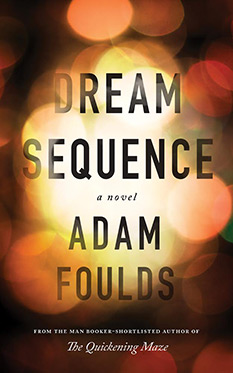
Dream Sequence is ostensibly a straight-forward story of a lonely woman, recently divorced, who stalks a B-list movie star whose career is on the ascendancy. When she contrives to meet this man of her dreams, her fantasy world undergoes an abrupt collision with reality. The collision produces no insight, not at least for the characters. As for the readers, the collision offers ample opportunities for reflection upon the nature of personal identity in a world saturated by new media and what kind of an ecosystem that produces for the nurture of relationships. Hence the word “ostensibly” at the opening of this paragraph.
Kristen was once the PA for a man who left his wife and took up with her instead. Predictably, she has now suffered a similar fate as her erstwhile husband has taken up with wife #3. The divorce settlement has left Kristen comfortably well-off in a Philly suburb where she can tootle off to yoga classes and watch episodes of The Grange, an English dramatic series. After a chance encounter with one of the show’s stars, Henry Banks, Kristen develops more than a passing interest in his career trajectory and personal life. There is the old joke about poor Americans as embarrassed millionaires. Kristen lives the relationship equivalent of that joke. The fact that she isn’t in an actual relationship with Henry Banks is an incidental fact that she will one day rectify. A bird in the bush is more or less the same thing as a bird in the hand.
For his part, Henry Banks has wrapped up the final season of The Grange and is plagued by an uncertain future and by attendant financial and personal insecurities. He auditions for the lead role in a film by the esteemed Spanish director, Miguel Garcia, a role which would vault him to the A-list and secure his place in the pantheon of respected actors. Foulds nicely captures Banks in all his glorious insecurity as he stalks Garcia through the streets of London after the audition and follows him into the National Gallery. There is a delicious irony in the stalking victim who himself partakes in a little stalking.
I note a synaesthetic element here as Banks and Garcia stand before paintings of both the Renaissance and Impressionist eras, discussing what they see and what it might mean, all the while skirting around the only question that matters: did Banks get the part? Perhaps because I’m a photographer, I’m taken by authors who give free play to their visual imaginations. Others who come to mind are John Berger, Ali Smith, and Teju Cole. In a way, such writing accompanies a major shift in communication media from telephony to texting (emojis & memes) to video conferencing whose role in our interpersonal dealings has, of course, been accelerated by the pandemic. I not sure what these synaesthetic riffs mean, but I intuit they are somehow significant and I bookmark them for future study. (It may or may not be relevant that Foulds dedicates this novel to his wife who is a photographer.)
Later, Henry attends a film festival in Doha where he is feted along with other cast members of a recent film. There, he hooks up with an American usher/model named Virginia and the pair start up a tenuous relationship. It’s utterly vapid. Global in scope. Minuscule in substance. A thoroughly post-modern way of being a couple in a world where being a couple has no point. Now that he has the part in the Garcia film, he can relax, only he can’t relax. His insecurities know no bounds and the minute he finds relief from one point of anxiety, another takes its place. Now that he has a part in an iconic director’s movie, he expects his performance will fall flat and he’ll be an utter failure. He finds relief from that point of anxiety by the prospect of a role in the Marvel universe where, like Benedict Cumberbatch, he’ll move from respectability to money. He’s particularly excited by the fact that as a Marvel hero he’ll be able to afford a PA. Which returns us to Kristen.
Kristen flies to London with the intention of insinuating herself into Henry’s life. She has no plan. Like a good actor, she’ll improvise when she gets there. She discovers that Henry’s father is staging a musical he has written based on the Brownings (Elizabeth Barrett & Robert), which proves as delightfully awful as it sounds, and she uses the after party as her opportunity. Although Henry’s agency has made her, she eludes them and entices Henry back to her hotel room. Not to worry. Like a Marvel character, Henry has a superpower which is the power to be so thoroughly self-absorbed he doesn’t care what’s going on. He climbs on her, pulls out, cums on her stomach, cleans himself up, and leaves.
Although the encounter between Kristin and Henry, and its subsequent fallout, is horrifying, the account is eminently readable. Foulds is a consummate stylist. Dream Sequence is slender enough to make a fine afternoon read and pairs well with a smooth single malt, a 12 year old Highland Park, for example.